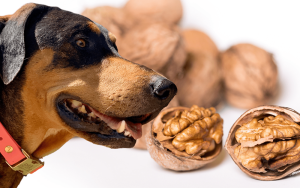Can Dogs Eat Blackberries? A Comprehensive Guide to Berry Safety and Benefits for Your Pet

As pet owners, we often wonder what foods we can safely share with our dogs. From treats to snacks, it’s essential to know which foods are healthy for them and which can be harmful. One common question many dog parents ask is: Can dogs eat blackberries?
In this article, we will explore the safety of blackberries for dogs, their nutritional benefits, potential risks, and tips on how to incorporate them into your dog’s diet. By the end of this guide, you will have all the information you need to make an
informed decision about giving blackberries to your furry friend.
What Are Blackberries?
Blackberries (Rubus fruticosus) are small, dark purple to black fruits that grow on thorny bushes in the wild and cultivated gardens. Known for their sweet-tart flavor, blackberries are packed with vitamins, antioxidants, and fiber, making them a popular
choice for humans. But how do these delicious berries stack up when it comes to feeding them to our dogs?
Can Dogs Eat Blackberries?
The short answer is yes, dogs can eat blackberries in moderation. These berries are generally safe for dogs, and many dogs enjoy the sweet, juicy taste. Blackberries offer a range of health benefits, and as long as you follow the recommended guidelines,
they can make a great, low-calorie snack for your pup.
However, there are a few things you need to keep in mind when offering blackberries to your dog. Let’s take a deeper dive into their safety, benefits, and any risks involved.
Health Benefits of Blackberries for Dogs
Blackberries are a nutritional powerhouse, offering several benefits for your dog’s health. Here are some of the key reasons why blackberries can be a healthy treat for your dog:
1. Rich in Antioxidants
Blackberries are packed with antioxidants like vitamin C, vitamin A, and anthocyanins. These antioxidants help neutralize free radicals in the body, supporting your dog’s immune system and reducing inflammation. Antioxidants play a crucial role in slowing
down the aging process and promoting overall health, especially for senior dogs.
2. High in Fiber
Blackberries are an excellent source of dietary fiber. Fiber helps with digestion and promotes a healthy gut. For dogs suffering from mild constipation or digestive issues, adding small amounts of blackberries to their diet can help keep things moving
smoothly. Additionally, fiber can aid in weight management by promoting a feeling of fullness, making it a great treat for overweight dogs.
3. Low in Calories
Blackberries are low in calories, which makes them a perfect snack for dogs that need to lose weight or maintain a healthy weight. A small handful of blackberries can provide a satisfying treat without significantly increasing your dog’s daily caloric
intake. This is especially beneficial for smaller breeds or dogs with a sedentary lifestyle.
4. Rich in Vitamins and Minerals
Blackberries contain several essential vitamins and minerals that contribute to your dog’s overall well-being. These include:
- Vitamin C: Supports the immune system, skin health, and collagen production.
- Vitamin K: Important for blood clotting and bone health.
- Manganese: Plays a role in bone development and metabolism.
- Folate: Essential for cell growth and proper function of the nervous system.
5. Hydration Benefits
Since blackberries have a high water content, they can contribute to your dog’s hydration, especially during warmer months. Proper hydration is critical for maintaining healthy bodily functions, and feeding your dog water-rich fruits like blackberries
can help ensure they stay hydrated.
Potential Risks of Feeding Your Dog Blackberries
While blackberries offer several health benefits, there are some risks to be aware of. By following the guidelines, you can minimize these risks and provide a safe treat for your dog.
1. Choking Hazard
Like any fruit, blackberries can pose a choking hazard for dogs, particularly smaller breeds or dogs that tend to swallow food quickly. To reduce this risk, always cut the berries into smaller pieces before feeding them to your dog. Additionally, supervise
your dog while they are eating blackberries to ensure they chew them properly.
2. Gastrointestinal Upset
Too many blackberries can cause digestive issues such as diarrhea or an upset stomach. This is particularly true if your dog isn’t used to eating fruits or high-fiber foods. It’s important to introduce blackberries gradually into your dog’s diet and observe
any changes in their digestion. Stick to a small number of berries to avoid potential gastrointestinal distress.
3. Potential Pesticides
If you are feeding your dog store-bought blackberries, it’s crucial to wash them thoroughly to remove any pesticides or chemicals that may be present on the skin. Pesticides can be harmful to dogs if ingested in large quantities. If possible, opt for
organic blackberries to reduce the risk of chemical exposure.
4. Diabetic Dogs Should Avoid Excessive Berries
While blackberries are lower in sugar compared to some other fruits, they still contain natural sugars. If your dog has diabetes or is at risk for developing it, you should consult your veterinarian before adding blackberries to their diet. A veterinarian
can help you determine the appropriate portion size based on your dog’s individual health needs.
5. Allergic Reactions
Although rare, some dogs may have allergies to certain fruits, including blackberries. Signs of an allergic reaction can include itching, swelling, vomiting, or diarrhea. If you notice any of these symptoms after your dog eats blackberries, discontinue
feeding them the fruit and contact your veterinarian.
How to Safely Feed Blackberries to Your Dog
If you’ve decided to give your dog blackberries, here are some essential tips to ensure you do so safely:
1. Moderation Is Key
As with any treat, blackberries should be given in moderation. A few blackberries here and there are sufficient to reap the benefits, but too many could lead to digestive issues. For small dogs, start with just one or two berries. Larger dogs can enjoy
a handful of blackberries, but always be mindful of their overall diet and calorie intake.
2. Wash Thoroughly
Always wash blackberries thoroughly before offering them to your dog. This helps remove any dirt, pesticides, or chemicals that could be harmful. Organic blackberries are a safer option, as they are grown without synthetic pesticides.
3. Cut Them Into Smaller Pieces
If your dog is a small breed or tends to swallow food whole, it’s a good idea to cut the blackberries into smaller pieces. This will reduce the risk of choking and ensure your dog enjoys their treat safely.
4. Use as a Training Reward or Snack
Blackberries make a great alternative to traditional dog treats. You can use them as a training reward or a low-calorie snack between meals. This can be a fun way to add variety to your dog’s diet while still providing essential nutrients.
5. Monitor for Adverse Reactions
After giving your dog blackberries for the first time, monitor them for any signs of allergies or digestive upset. If your dog shows any symptoms such as vomiting, diarrhea, or excessive gas, stop giving them blackberries and consult your vet.
Are Blackberries Safe for All Dog Breeds?
While most dogs can safely eat blackberries, individual dogs may have different tolerances based on factors such as size, age, and health conditions. Here are some considerations for specific types of dogs:
-
Small Dogs: Due to their smaller size, small dog breeds may have a harder time eating large or whole blackberries. Always cut the berries into smaller pieces and limit the number of berries given.
-
Senior Dogs: Older dogs can benefit from the antioxidants in blackberries, but if your dog has a sensitive stomach, start with just one or two berries and observe how they react.
-
Dogs with Diabetes: Diabetic dogs should only have blackberries under the supervision of a veterinarian. While blackberries have a low glycemic index, they still contain natural sugars that could affect blood sugar levels.
-
Puppies: Puppies can generally eat blackberries, but their digestive systems are more sensitive. Be sure to introduce them slowly and watch for any signs of gastrointestinal upset.
Conclusion
In conclusion, blackberries can be a healthy, tasty treat for dogs when given in moderation. Packed with antioxidants, vitamins, and fiber, blackberries offer numerous health benefits, from supporting your dog’s immune system to improving digestion. However,
it’s important to introduce them gradually into your dog’s diet, watch for any allergic reactions, and always practice moderation to avoid any potential digestive issues.
By following the guidelines provided in this article, you can safely include blackberries as part of your dog’s treat rotation. As always, if you’re ever unsure about introducing a new food into your dog’s diet, consult your veterinarian to ensure it’s
the right choice for your pet’s health and well-being.
So, next time you’re enjoying a handful of blackberries, don’t hesitate to share a few with your furry friend – they just might love them as much as you do!






